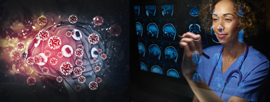Immune Checkpoint Inhibitor Nivolumab for Patients with Rare CNS Cancers

National Cancer Institute researchers are conducting a study of patients with rare central nervous system (CNS) tumors. More than 130 primary rare CNS (brain or spine) tumors have been identified. Most affect less than 2,000 people in the United States each year. This study will test whether stimulating the immune system using the drug nivolumab can shrink select rare brain or spine tumors or increase the time it takes for them to grow or spread.
What the study involves:
- Full physical and neurological examination
- Patient questionnaire about health and symptoms
- Series of MRIs and neurological function tests
- Study of tumor tissue from prior surgeries
- Receive drug nivolumab for up to 20 treatments over 64 weeks
- Your samples used for genetic testing
- Monitoring for up to five years after treatment
You can participate if you:
- Are age 18 or older
- Do not have hepatitis
- Are not pregnant or breastfeeding
- Are diagnosed with CNS tumors that have returned
Tumor Types Include:
Atypical Teratoid Rhabdoid Tumor (ATRT), Choroid Plexus Tumors (Carcinoma, Papilloma, Atypical Papilloma), Ependymoma, Gliomatosis Cerebri, Gliosarcoma or Primary CNS Sarcoma, Histone Mutated Glioma, Medulloblastoma, Meningioma (High Grade), Pineal Region Tumors (Pineoblastoma, Pineocytoma, PTID, PTPR), Pleomorphic Xanthoastrocytoma (PXA) and Anaplastic Pleomorphic Xanthoastrocytoma (APXA) and Primitive Neuroectodermal Tumors (PNET)
You can participate in this study by visiting the NIH for a clinical assessment.
The NIH Clinical Center, America's Research Hospital located in Bethesda, MD, Metro red line (Medical Center stop).
For more information:
NIH Clinical Center
Office of Patient Recruitment
800-411-1222 (refer to study 17-C-0102)
(TTY users dial 7-1-1)
Se habla español
Email: ccopr@nih.gov
Or go online:
https://go.usa.gov/x7YC5
Department of Health and Human Services
National Institutes of Health Clinical Center
National Cancer Institute
